Leeds United's wilderness years: How Marcelo Bielsa helped one of England’s biggest clubs finally rise again
Leeds can finally call themselves a Premier League team once more. FFT retraces an extraordinary journey of upsets, angst and unruly ownership with ex-bosses, players and a famously tearful fan
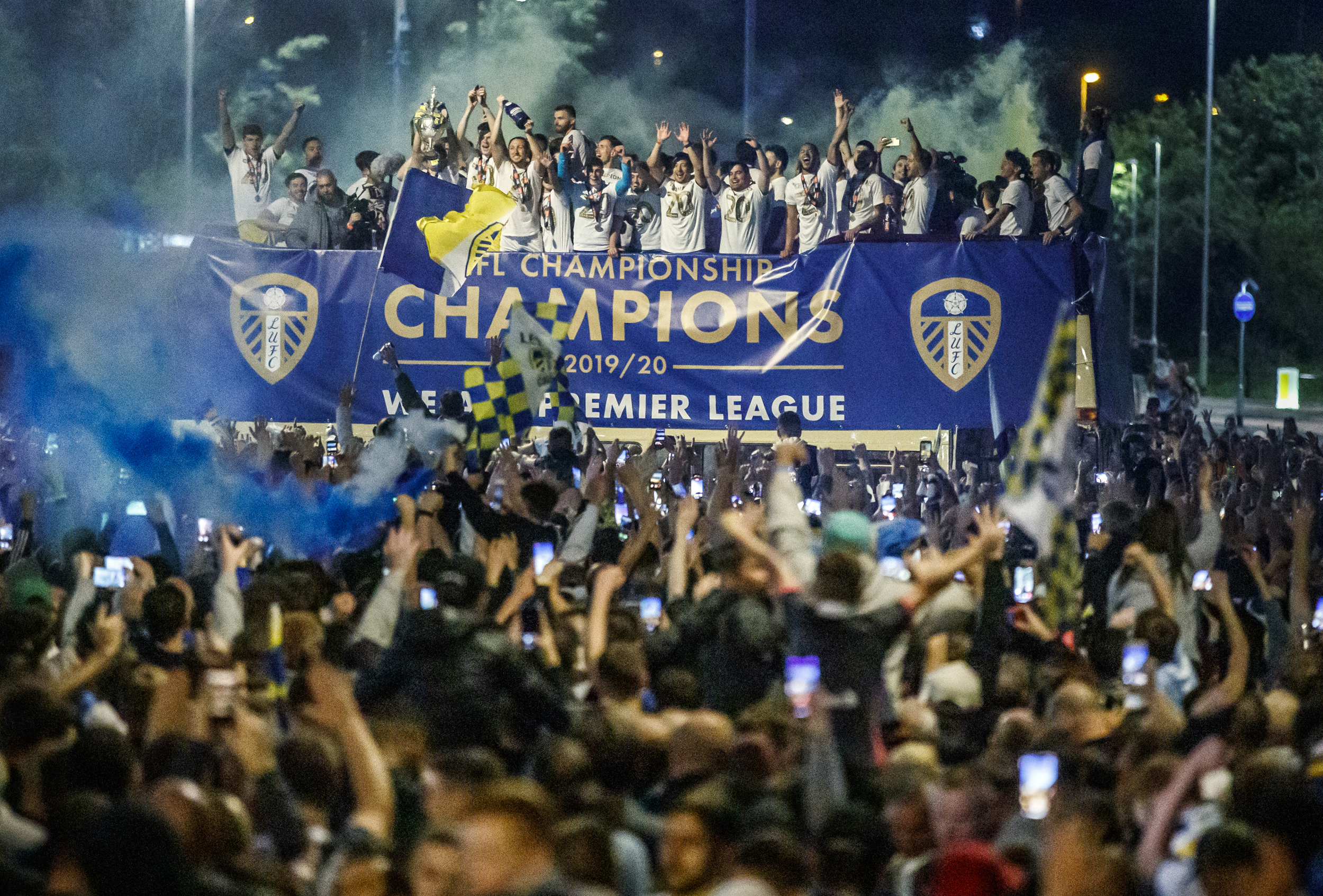
This Leeds feature first appeared in the Season Preview 2020/21 issue of FourFourTwo magazine. Buy it now and get free delivery!
Leeds United fans stood disconsolately in the rain at the compact Glassworld Stadium, as a postman rose highest to meet a corner-kick and deliver the moment they had dreaded.
Champions League semi-finalists just seven years earlier, now defender Matt Langston's header had put them on course for a defeat against a village team in the second round of the FA Cup. Being down in League One was bad enough, but this was even worse - Histon 1 Leeds 0.
SEASON PREVIEW Will Leeds United's Bielsa-ball work in the top flight?
“In the dressing room after the game, I sat there thinking, ‘What the hell happened out there?’" midfielder Jonathan Douglas recalls to FourFourTwo, 12 years on. “You’re playing on live television, you’re representing Leeds United and you should be beating teams like that. But somehow we weren’t able to. I felt really embarrassed.”
Defeat at Histon proved the nadir, the low point of an extraordinary 20-year journey for Leeds. It was one that began in Barcelona and Milan at the turn of the millennium, then sent them crashing to the depths of despair – the worst moments in the club’s long and distinguished history.
But finally, that journey has ended with redemption. Finally, thanks to the genius of Marcelo Bielsa, Leeds are back in the Premier League after 16 long years away. This is the story of how it went so wrong, and how one of England’s biggest clubs finally rose again.
Get FourFourTwo Newsletter
The best features, fun and footballing quizzes, straight to your inbox every week.
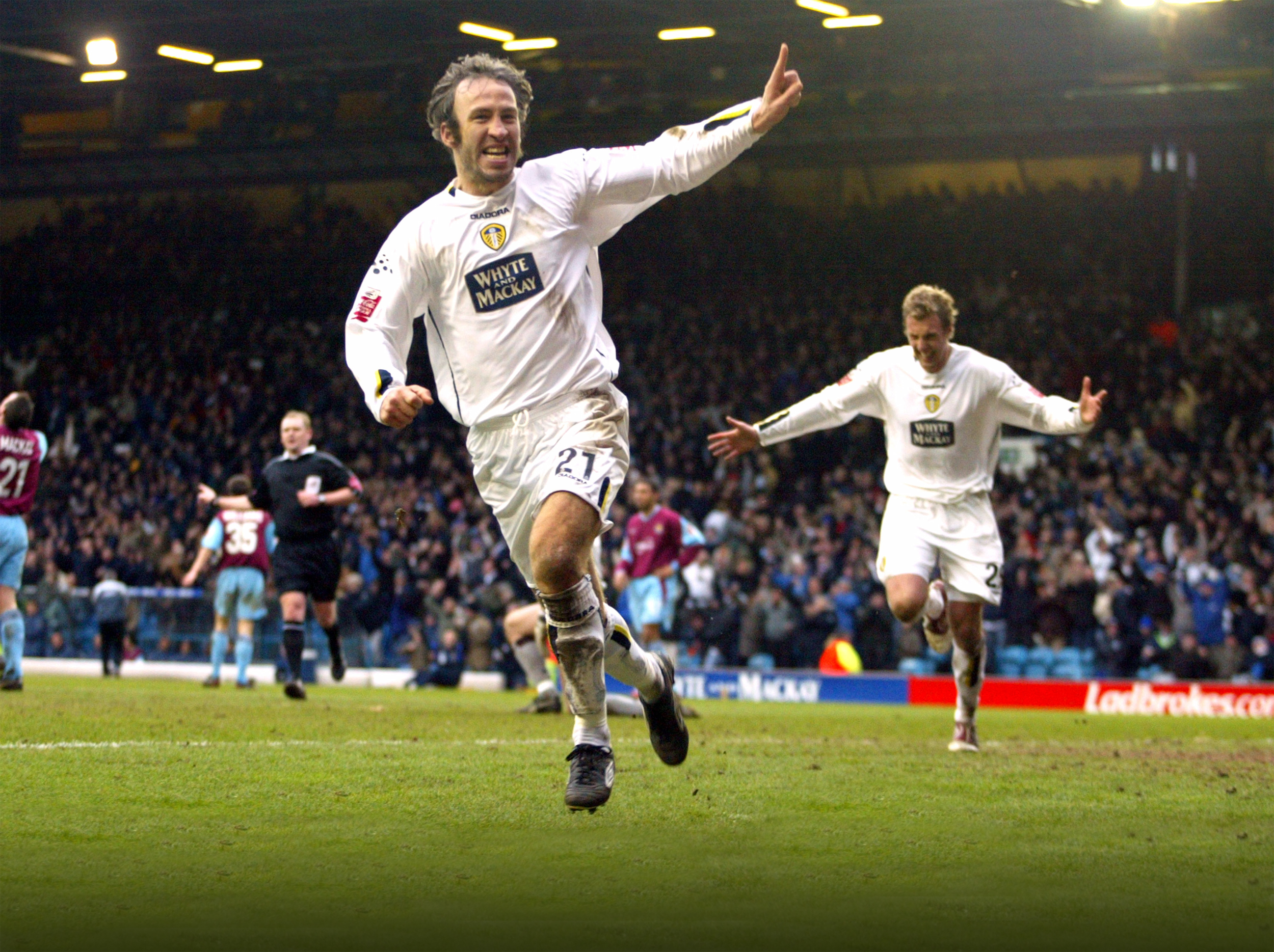
An oil tanker heading for the rocks
Eddie Gray remembers the immense pride he felt when he watched the great Leeds team of 2000/01. Assistant to David O’Leary back then, the Whites legend had previously been youth team coach, helping to bring through an incredible crop of emerging talent.
“If we could have kept all of those players together, we’d have taken some beating,” he tells FFT now. “Jonathan Woodgate, Harry Kewell, Stephen McPhail, Alan Smith – they played for the first team when they were 17 or 18. Then we had guys like Rio Ferdinand, Mark Viduka, Lee Bowyer, Olivier Dacourt – so many fantastic players. That team was as good as anybody.”
LEEDS FEATURES 7 things Marcelo Bielsa will bring to the Premier League
In Europe that season, they showed how good they were.
“I just remember the Champions League music and the excitement of those matches under the lights at Elland Road, particularly the Milan game when Bowyer came up with a last-minute winner,” smiles lifelong Leeds supporter Ricky Allman, thinking back to his youth. “Some of my first memories watching Leeds were the ultimate. We were watching Rivaldo and Real Madrid’s Galacticos. I felt it was never going to end.”
Only a last-gasp Rivaldo equaliser denied them victory over Barcelona at Elland Road. They beat Besiktas 6-0 and drew 1-1 in Milan, to progress at Barça’s expense. A 1-0 victory at Lazio helped Leeds finish as runners-up to Real Madrid in the second group phase, then Deportivo La Coruna were dispatched 3-0 inthe quarter-final first leg. After advancing 3-2 on aggregate, a fine Valencia side eventually halted their run.
But the 18-game European adventure took its toll – Leeds sat 13th in the Premiership on New Year’s Day (albeit with games in hand), and mid-season signings were required to turn things around. They spent £18 million on West Ham’s Ferdinand, then a world record fee for a defender, while Robbie Keane was recruited on loan from Inter ahead of a £12m permanent deal. Leeds finished fourth, one point short of securing a second successive Champions League campaign, and the vital revenue that their chairman Peter Ridsdale had already budgeted for.
Leeds led the league table on New Year’s Day in 2002, but they had spent even more money: £9m on Seth Johnson and £11m on Robbie Fowler. After they fell to fifth place, O’Leary was sacked at the end of the season, having annoyed Ridsdale with his book Leeds United On Trial – detailing the events at the club during an infamous court case involving Bowyer and Woodgate, following an incident outside a nightclub. Bowyer was later cleared, but Woodgate was convicted of affray. When O’Leary departed the Elland Road dugout, things went rapidly downhill.
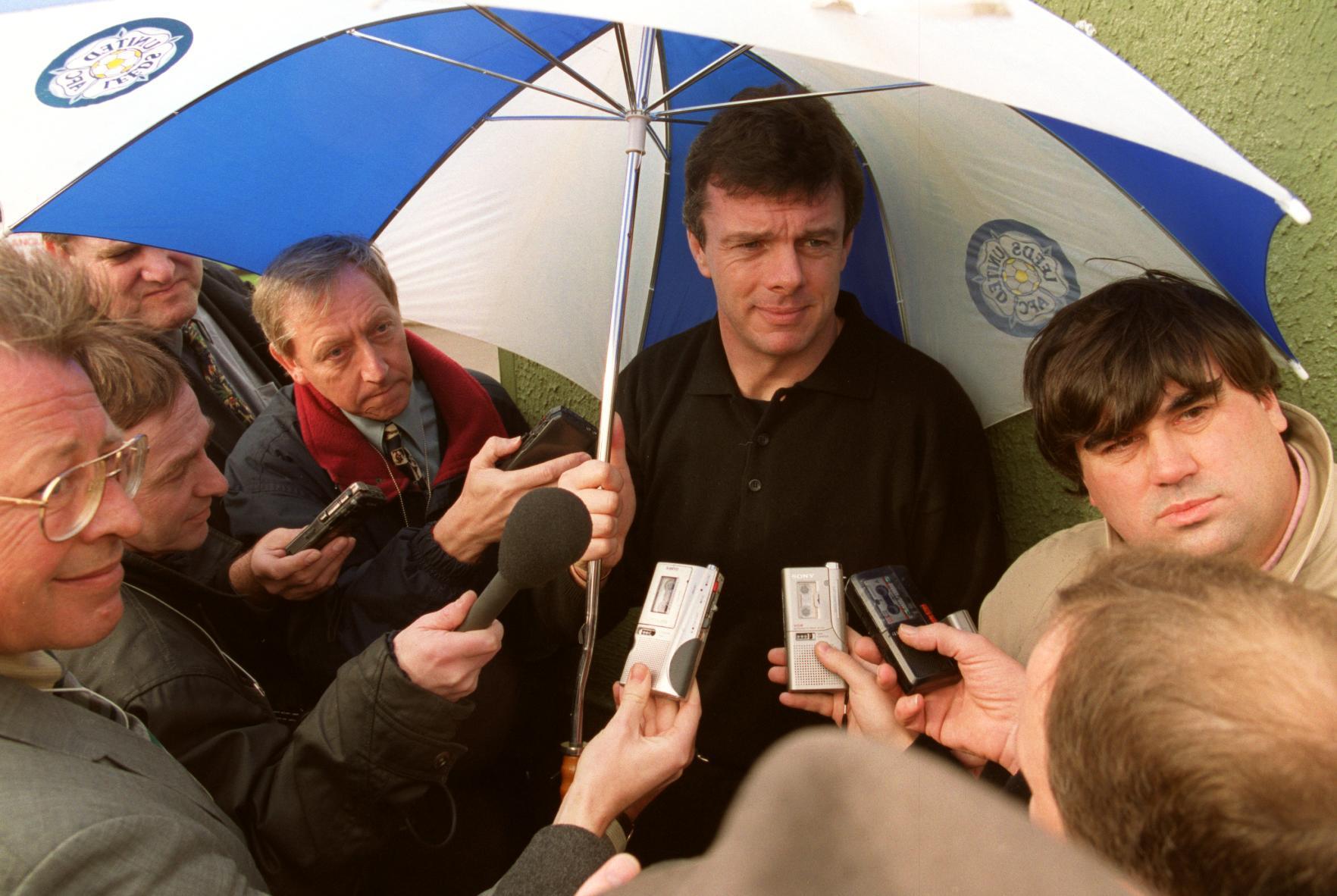
“We had too many players to sustain the wage bill, so we had to let top-class players leave,” Gray remembers ruefully. Ferdinand, Keane, Woodgate and Fowler were all sold – and so eager were Leeds to let Fowler go, they continued paying a portion of his salary. Under new boss Terry Venables, the Whites slid to a relegation battle.
Peter Reid stepped in to keep the club up, but then Ridsdale resigned. Sizeable debts had sparked criticism from supporters, with expenditure infamously including goldfish for the chairman’s office. “When it came out that we were spending hundreds of pounds on goldfish, you wondered what was going through his mind,” says fan Allman.
MEET THE MANAGER A year with Marcelo Bielsa: the inside story of Leeds United's revival
New chairman John McKenzie likened the club to “an oil tanker heading straight for the rocks”. “The trouble with oil tankers,” he said, “is they’re two miles long and they don’t turn around in two minutes.”
Kewell and Dacourt were flogged in the summer of 2003, and the squad was padded out with loan signings – among them Roque Junior, who struggled badly. After a 6-1 loss at newly promoted Portsmouth – the club’s worst since 1959 – Leeds were bottom of the league and Reid was sacked. They turned to Gray, a two-time title winner in the Don Revie era, and manager for a few years during the ’80s. Having left when Reid took charge, he agreed to return as temporary boss.
“Going back is the one thing I regret in my whole career at Leeds,” says the Scot. “When Reid had the job, I was looking at it from the outside thinking, ‘Peter, you’ve got no chance here’, with the way that the club was being run. As soon as I went back there, I thought, ‘This is tough’.
“Once a club gets on a downward slope, it’s really hard to rectify – especially if you’ve got no money. Then when they’re asking the players to defer their wages and take wage cuts, it can lead to split camps among the group. Some might be able to afford a wage cut, others might not.”
As the role of chairman passed from John McKenzie to Trevor Birch to Gerald Krasner that season, relegation to the Championship was effectively confirmed with a 4-1 loss at Bolton. It was all too much for an 11-year-old Ricky Allman, whose tears in the away end were captured on camera and then beamed around the world. It was the iconic image of Leeds’ decline.
“When Mark Viduka got sent off and Bolton scored one, two, three, four, I just couldn’t hold back the emotion any more, knowing
the inevitable was going to happen,” Allman, now 27, tells FFT. “As I was coming out of the stadium, my mum rang me – she was crying and asked if I was all right. She said, ‘You’ve been on the telly, crying your eyes out’. That night I said to her, ‘My world has ended’. You don’t see further than that as a young lad.”
As the final whistle was blown, Alan Smith and Paul Robinson were struggling to hold back the tears, too. “A lot of the players grew up at the club,” explains Gray. “The dressing room was really quiet, with a lot of emotion, and I was disappointed with my own efforts. Regardless of the situation, you always think you can do better.”
"If this is justice, I'm a banana"
Leeds came 14th in their first season in the Championship under Kevin Blackwell, after almost the entire squad left – even James Milner, sold to Newcastle at 18. In January, Ken Bates arrived as chairman, 18 months after selling Chelsea to Roman Abramovich.
“I was the first signing under Ken Bates’ ownership,” midfielder Shaun Derry tells FFT.
“The club was in a massive transitional period – lots of new signings and a lack of stability.” Leeds pushed for automatic promotion the following season, 2005/06, but won just one of their last 10 games. After beating Preston 3-1 on aggregate to reach the play-off final, they were hammered 3-0 by Watford in the Millennium Stadium showpiece.
“Losing 3-0 was such a horrible experience, because everyone expected us to win,” says Derry. “It knocked us back – there were only three and a half weeks until pre-season and I don’t think we recovered in time. It was just a horrible hangover.”
The Whites were soon in the Championship relegation zone, and Blackwell was sacked. Caretaker manager John Carver presided over a 5-1 loss at Luton, before Bates brought in former Chelsea captain Dennis Wise. Amid cost-cutting measures, the new boss couldn’t arrest the slide.
“We were still dealing with all the financial issues,” continues Derry. “More problems off the field – little things like travel plans, hotels, a real drop in what the club had been used to. It had a knock-on effect, and games were like cup finals every week – when you played the likes of Colchester, with respect to them, they found another 20 per cent against Leeds.
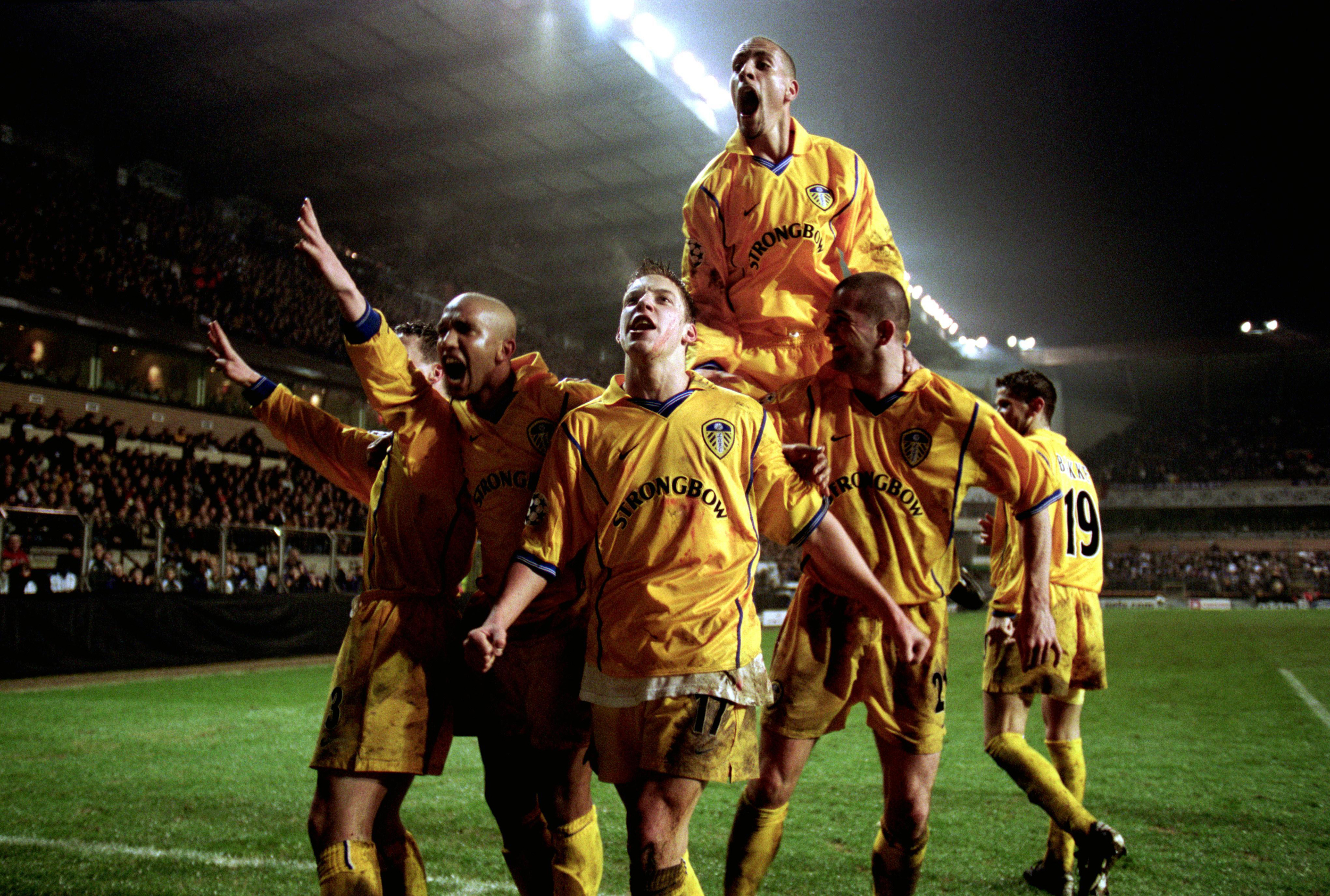
“The supporters were brilliant and always have been – but when you’re not doing your job, they let you know. Some players thrived in the Leeds shirt, others crumbled.”
With one game remaining, Leeds’ fate was sealed. Three points from safety, needing an unrealistic goal difference swing on the final day, they were heading to the third tier for the first time in their history. “We just didn’t perform on and off the field, so we got what we deserved,” concedes Irishman Jonathan Douglas. “It was devastating. A club the size of Leeds shouldn’t be in League One – it was a shock to us all.”
“Just Leeds being in the Championship was already unthinkable,” says Derry. “I’ve been watching football all my life and I see them as a top-six club in Great Britain. You’re with a top-six club and you’re getting relegated to League One – you can’t even begin to explain the embarrassment around that.”
“I’d been brought up watching Barcelona, Real Madrid and Milan, and now I was going to be seeing Crewe, Leyton Orient and Yeovil,” laments Allman.
A couple of days before the final game of the 2006/07 season, Bates took advantage of a loophole in Football League regulations by putting the club into administration. The 10-point deduction would be applied to the current campaign, and therefore be totally meaningless. Hours later, Bates agreed a deal with the administrators to buy the club back, teaming up with Shaun Harvey, who would later become chief executive of the EFL.
Players were asked to take wage deferrals. “I remember turning up for pre-season and we were using the previous season’s training kit with the sponsor covered up, a big patch over it,” recalls Douglas. Derry adds, “There were pre-season friendlies that potentially weren’t going to be played because certain people were still owed money – it was just an absolute car crash.”
Supporters protested against Bates, who responded with a lengthy open letter hitting out at a variety of enemies, from potential investors to departed youngster Danny Rose. Things got worse a week before Leeds’ first game in League One, away at Tranmere. The Football League, unhappy that the club had exited administration without a Company Voluntary Agreement – after initially offering creditors a paltry 1p in the pound – imposed a new points deduction. The club would start on minus 15. “That just made it even harder,” explains Douglas. “Even though you’re Leeds and it’s League One, we realised it would be very difficult after that.”
Leeds won their first seven league games, wiping out the deduction, and were fifth in December – only two points behind leaders Swansea. Wise set his players the target of being top by New Year’s Day. Instead, they were still fifth in late January, when he left to become executive director at Newcastle under new owner Mike Ashley. Elland Road great Gary McAllister replaced him as boss, but Leeds ended up in the play-offs.
“When we won at Yeovil late in the season, I looked at the table and thought, ‘Had we not had the minus 15, we’d have just been promoted’,” remembers Casper Ankergren, the team’s Danish goalkeeper.
An appeal against their penalty was finally rejected in the very last week of the season. “If this is justice, I’m a banana,” responded Bates. Leeds got to the play-off final but lost to Doncaster at Wembley. “We felt cheated out of promotion,” says Douglas.
With no points deduction the next season, 2008/09, the only obstacle was Leeds’ ability to self-destruct – as they did in the FA Cup at Histon. “If it hadn’t been on television, that game would definitely have been called off,” suggests Douglas. “There were puddles in the middle of the pitch and we thought, ‘There’s no way this game can go ahead’. Then when it did, you thought, ‘Oh no, an upset could be on the cards here’. It’s a day that I’ve tried to forget ever since.”
Fergie 1 Grayson 0
Days before Christmas, Leeds were ninth and McAllister was replaced by Simon Grayson, who was tasked with turning the club around. The new boss was a lifelong Leeds fan and former youth team graduate.
“Even though I was managing halfway up the Championship with Blackpool, it was too good an opportunity to manage a club you support – one of the biggest in the country,” he tells FFT. “I was immensely proud walking down the tunnel for my first match. The club needed revitalising. I knew what it meant to the fans – we had to reconnect with them.”
Grayson lifted Leeds to fourth, but they lost in the play-offs again – this time to Millwall in the semi-finals. “We said, ‘We’ve got to use this as motivation for next season – we don’t want the play-offs, automatic promotion is the least that all these supporters deserve,’” he explains now.
Leeds were eight points clear at the top of League One in January 2010, when they travelled to rivals Manchester United in the FA Cup third round. “People forget that when the draw was made, we’d just drawn 1-1 at Kettering,” states Grayson. “They took us to extra time at Elland Road in the replay, so it nearly didn’t happen. Man United were the reigning Premier League champions, but we knew how to win games. We said, ‘Why can’t we be the big upset this time, rather than the other way around?’”
Sir Alex Ferguson had never lost an FA Cup tie to opposition from outside the top flight, but Jermaine Beckford bagged the winner – despite having handed in a transfer request days earlier, amid interest from Newcastle.
“That’s a game I’ll remember for the rest of my life,” says Ankergren. “I didn’t realise how huge the rivalry was, until I saw grown men crying in the stands because we’d just won away at Manchester United.”
“We had 9,000 supporters there,” enthuses Grayson. “I remember walking down the side of the pitch to go to the press area at the end of the game, and they were all still there. Our head of media was walking really quickly and I said, ‘Slow down – we might never be part of this again, so let’s enjoy listening to them’. Before that, all the headlines about Leeds had been negative things. That put us back in the spotlight for the right reason.”
Not that it helped their form in the league. “It probably hindered us, although I wouldn’t have swapped it,” says Grayson. “It was hard for the players to get going again after such a big result. We drew at home to Wycombe and then lost at Exeter.”
The Whites went into the last game of the season in second, needing victory over Bristol Rovers. “There were 38,000 fans inside Elland Road, and if you could write a movie on how a final day would end, that would be a great script,” says Grayson. “We were down to 10 men before half-time, 1-0 down, and then we won 2-1. I felt pride to seal promotion with the club I supported, but more relief because we’d nearly missed out. Fans were kissing the turf – you realised how much it meant that we’d got out of League One.”
No one thought it would take another 10 years to make the next step to the Premier League. Grayson felt they could do it in one, despite Beckford’s exit to Everton.
“I’ll never forget that Ken Bates gave me the chance to go to Leeds, but he could have helped us more when we got back up to the Championship,” he reflects. “There always seemed to be a law case against someone. He was always upsetting someone.
“As a boss, you’d always like more funding. At Christmas we went up to second, and if we’d been able to strengthen with a couple of players in January, I honestly believe we’d have at least made the play-offs. I had a few offers to leave and manage in the Premier League, but I wanted to fulfil that with Leeds – as a supporter, that was my dream.
“But we came seventh, and you could feel that things were going in a negative direction again. Kasper Schmeichel and Max Gradel got sold, and there was more resentment from fans towards the owner. The next season, we were only three points off the play-offs when I lost my job.”
"The 2am calls? Not for me"
Leeds finished 14th under Neil Warnock in 2011/12, then 13th when Brian McDermott arrived in April 2013. Massimo Cellino bought the club a year later, having initially failed the Football League’s Owners’ and Directors’ Test after a conviction for evading tax on a yacht.
Known for burning through 36 managers in 22 years as owner of Cagliari, Cellino sacked McDermott before he’d even bought Leeds – only to be told he didn’t yet have the power to do so. McDermott was reinstated a game later, but he was clearly on borrowed time: the ex-Reading gaffer departed after Cellino criticised him for taking a summer holiday that year. “Who is managing this club? Brian, where is Brian?” the Italian asked.
McDermott’s successor was left-field: Dave Hockaday, first-team coach at Watford when they downed Leeds in the 2006 play-off final, but a man whose only managerial experience had been an underwhelming four-year spell at non-league Forest Green.
“I hadn’t applied for the job, I just got a call from an Italian-sounding voice asking, ‘Would you be interested in meeting my patron who has an interest in an English club?’” Hockaday explains to FFT. “I thought, ‘Italian – well it’s either Leyton Orient or Leeds’, so I did a load of homework on both. Then they asked me to get on a train, get off here, go round this back street, and they would meet me there – it was very cloak and dagger.
“I travelled to London, sat down in a private courtyard with the voice, and within half an hour Cellino walked in. I was thinking, ‘Does he want me to be an assistant coach to an Italian manager coming over here, or maybe the under-23s coach?’
“We talked football for about five hours and halfway through he said, ‘I really like the way you think – would you like to be head coach at Leeds United?’ When he said that, I leaned back and the voice asked, ‘Is it too much for you?’ I said, ‘No, it’s not too much’. But I said to Cellino, ‘Do you know what you’re doing? You know me, and lots of people in football know me – I’ve got a reputation as a decent coach – but the Leeds fans and the media will be saying, ‘David who?’ Are you prepared for that?’ He said, ‘I’m prepared for that’.
“I think they were looking for someone they felt would be a good coach, but wasn’t going to come in demanding things. The deal was that I’d pick the team and I could suggest new players, but Cellino and his recruitment guy would have the final say. I was unveiled in front of the Sky cameras – it was surreal.
“I’d seen Cellino’s record, I’m not daft, but I asked a lot of people and they said, ‘You’ve got to do it’. My hope was that we’d get some good players in and I could have a decent run at it. But he was just bringing in Italy-based players who weren’t good enough and I had a dysfunctional group, because all the senior players had been informed they were leaving. There was no food at the training ground and no match analysis, so I don’t think Marcelo Bielsa wouldn’t have taken on what I did. It was an incredibly chaotic situation.”
Hockaday’s recruitment suggestions often fell on deaf ears. “I said we needed a leader,” he explains. “Cardiff said we could have Mark Hudson for free, but Cellino said, ‘No, I don’t fancy him, who else?’ I said, ‘There’s a lad at Celtic, Virgil van Dijk, and there’s a lad called Craig Cathcart’. He wasn’t interested in any of those, then brought in Giuseppe Bellusci.
“Liverpool were prepared to give us Conor Coady for nothing, but he said, ‘Too young’ and went for Tommaso Bianchi. We did sign Liam Cooper from Chesterfield, though – that recommendation was listened to.”
The Italian’s eccentricities didn’t end there. “He would phone at odd times of the night, asking questions,” reveals Hockaday. “After a while, I stopped answering the 2am calls. Not for me. There comes a point where you say, ‘Listen, this is what I’m doing. You either believe in me or you don’t’.
“He’d ask, ‘What do you think about him?’ He’s obsessed with football, but I thought, ‘Flipping heck, am I going to be giving good answers at 2am?’ He’d expect you to be on the ball at whatever time of day.
“He’d question things, then I’d say, ‘This is why I’m doing it’ and he’d say, ‘Fine’. He was a frustrated coach – he wanted to be more hands-on. We had loads of chats, and a lot of them were very good, but sometimes you were thinking, ‘What was that all about?’”
Hockaday was handed only six matches to prove himself – Leeds lost four of them, and he was gone before August was out. “It was tough to take,” admits the 62-year-old, who left the professional game a couple of years later and coaches at South Gloucestershire and Stroud College these days. “I knew Leeds were a big club, but you don’t realise how big until you’re there. I could be up Mount Everest and there’d be a Leeds fan there.”
Grayson was targeted to replace Hockaday, but declined. “I was at Preston and Cellino asked me to go back,” he reveals. “My heart wanted to, but my head wasn’t sure it was right because of how he was as an owner. You hear things from people at the club and think, ‘This isn’t for me’.”
Far from luring a name like Marcelo Bielsa, Leeds were also snubbed by Darrell Clarke of Bristol Rovers. Cellino went through seven guys during his three-year reign – Hockaday’s Slovenian successor Darko Milanic lasted 32 days, shorter than Brian Clough’s infamous 44-day tenure at Elland Road. Neil Redfearn, Uwe Rosler, Steve Evans and Garry Monk followed, but none could get Leeds into the play-offs. They lost to non-league opposition again, at Sutton in the FA Cup.
The Argentine messiah arrives
After Cellino sold up to Andrea Radrizzani in May 2017, the following campaign brought much of the same. Leeds finished 13th, with Paul Heckingbottom taking over from Thomas Christiansen as boss mid-season. The Whites unveiled a bizarre new crest, only to scrap it hours later after objections from fans.
But in the summer of 2018, Bielsa became Leeds’ 15th boss in 14 years, and everything changed. “He gave everyone hope,” smiles Eddie Gray, still a regular at Elland Road. “We started to play a different brand of football, and the players bought into it. Since Marcelo came, some players have improved beyond recognition. He’s bought into the city and the fanbase. If our supporters got offered 15,000 tickets for an away game, we’d sell out.”
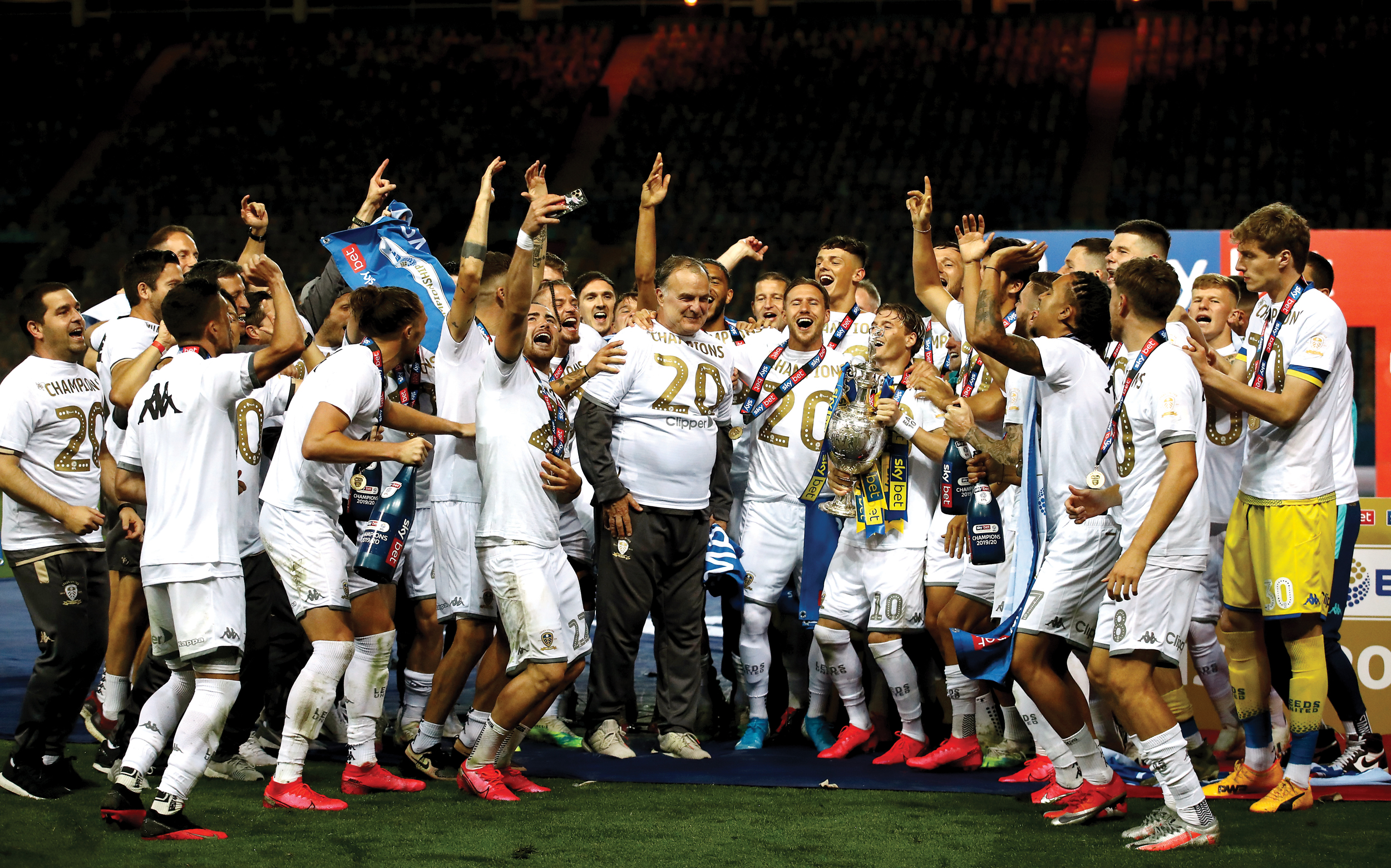
“There’s not much like this in the rest of the world – this feeling here that unites everyone, this passion and culture,” Bielsa said last year.
The Spygate dispute with Frank Lampard and Derby, in which police were called to the Rams’ training ground following sightings of a snooping Whites employee, only helped to strengthen that bond. “Bielsa’s a hero in our eyes,” says Allman. “Just the fact that it riled everyone up was funny – as Leeds fans, we like being hated by everyone else.”
But the Argentine’s first campaign ended in the worst way possible – with defeat to Lampard’s Derby in the play-off semi-finals, having looked set for automatic promotion. As opposition fans sang for so many years, Leeds were falling apart. Again. “That was right down there with my lowest moments watching us,” says Allman. “We should have been in the top two, then we went two goals up against Derby but imploded. Walking out of the stadium was horrible, thinking, ‘Are we ever going to get a better chance than that?’”
FEATURE The fall of Bolton Wanderers: How the Trotters reached their lowest ever league position
Supporters feared Bielsa would resign, but he stayed put after the club met his principal demand – not millions of pounds for signings, but the installation of a running track at the training ground. He took the brave decision to sell fan favourite Pontus Jansson, with whom his relationship was difficult.
For a while in 2019/20, history looked to be repeating itself. Leeds were top in December, a commanding 11 points clear of third-placed Fulham. By early February, they were clinging to a top-two spot on goal difference. But five straight wins – with five clean sheets – before lockdown re-established a solid position, and this time they got the job done. Led by Kalvin Phillips, Pablo Hernandez and Liam Cooper, Leeds won the league by 10 points.
“All the players learned from the previous season, and I think Marcelo learned from it too,” says Gray. “The players were so strong – not just physically, but in their minds. There wasn’t any doubt that we were going up this time – the atmosphere around Elland Road and the city was as good as I’ve ever known it, since I joined the club in 1963.”
Promotion was confirmed with two games left, after West Brom lost 2-1 at Huddersfield. As Allman watched on at home, 16 years of misery were erased. This time, there were no tears. “I was close though, really close!” he smiles now. “It was just relief. Finally. We’d waited so long for that moment.”
For Gray, it has been a period to reflect on the recent passing of Norman Hunter, Jack Charlton and Trevor Cherry, three of his old title-winning allies. “It would be a dream for me to see Leeds back in the Premier League in my lifetime,” Hunter wrote in October. He died in April, after contracting coronavirus.
“Promotion was a tribute to Norman, Jack and Trevor,” says Gray. “Norman used to go to every game – the last time I saw him was at the Huddersfield match in March, the one before lockdown. They’re sadly missed.”
Now, Leeds are relishing their return to the top flight and the variety of grudge matches it will throw up: Leeds vs Manchester United, Bielsa vs Lampard, Leeds vs Sheffield United and even Leeds vs Wolves – Radrizzani wrote to the FA in the latter’s 2017/18 promotion season, questioning their link to Portuguese super-agent Jorge Mendes.
“You can only see the club progressing even further under the present regime,” says Gray. “Leeds won’t be thinking about just surviving – they will be thinking, ‘We’re as good as any team’. I went down to the Emirates Stadium for the FA Cup tie in January, and we were as good as Arsenal – we should have won.
“The biggest disappointment is that fans won’t be able to go to the early matches. I’ll be delighted when they’re allowed back in, although a few visiting teams won’t be. But even without supporters, I’m looking forward to it. It’s been a long wait. Sixteen years...”
Those years brought some of the darkest moments in club history, but finally the hard times are long gone. Peter Ridsdale’s goldfish haunt them no more. Leeds United are back.
While you’re here, why not subscribe to the mag - and get every issue for less than £3.80 delivered to your door!
NOW READ...
FPL TIPS 27 essential Fantasy Premier League tips from old winners and experts
THE NEW ENGLAND KIT "We took inspiration from the France 98 shirt – fans still love that team"
GUIDE Premier League live stream best VPN: how to watch every game from anywhere in the world

Chris joined FourFourTwo in 2015 and has reported from 20 countries, in places as varied as Jerusalem and the Arctic Circle. He's interviewed Pele, Zlatan and Santa Claus (it's a long story), as well as covering the World Cup, Euro 2020 and the Clasico. He previously spent 10 years as a newspaper journalist, and completed the 92 in 2017.
